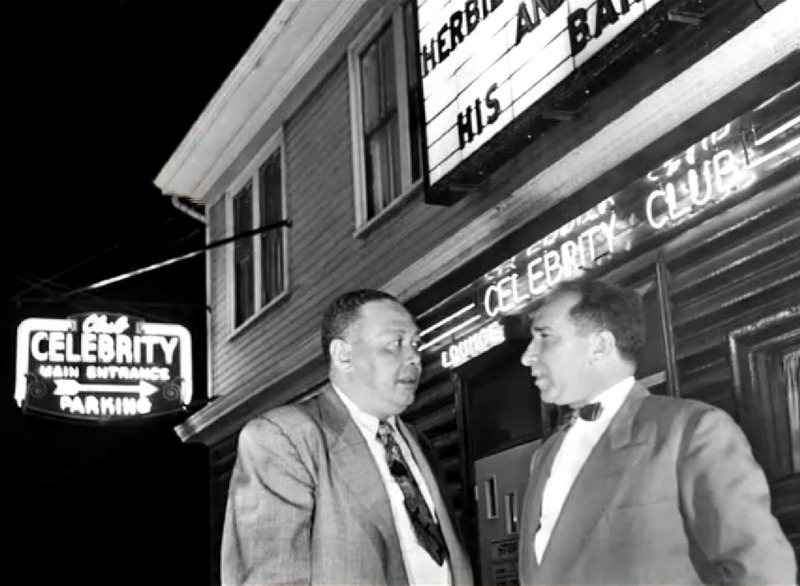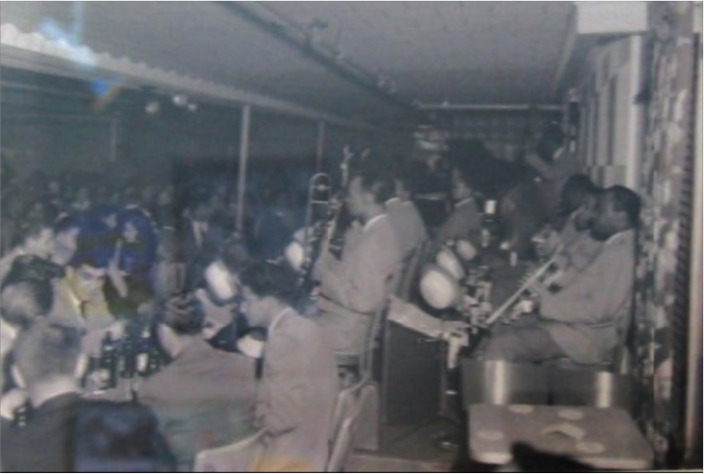
Imagine on any given night during the 1950s being able to hear the swinging sounds of Count Basie, the bluesy diva Billie Holiday, or Louis Armstrong, one of the greatest trumpet players of all time? No, I am not talking about the thriving Times Squares jazz scene in the Big Apple, but the fabled Celebrity Club, located in what’s now the redeveloped Randall Square in Providence.
From 1949 until 1960, this celebrated club and its founder Paul Fliippi, brought the world’s greatest jazz acts to the storied venue. The first integrated club in Providence attracted such luminaries as Nat King Cole, Duke Ellington, Sarah Vaughn, Sammy Davis Jr, and Fats Domino. All the great jazz acts stopped in Providence.
It was a list of jazz royalty that graced the stage. Seven nights a week catering to a diverse neighborhood that included African Americans, Italians, Jews, and a hip East Side crowd from around the Square and nearby neighborhoods, including Lippitt Hill. In the beginning, Filippi bought a dilapidated business at 54 Randall Square, near what is now Charlesgate Apartments, which provided an ideal entertainment spot for African American servicemen to hangout following the end of WW2. Meanwhile, residents of the diverse neighborhood helped fill the club, thus creating PVDs’s first integrated club complete with dance floor, coat room, kitchen and tables, remembers Ed Coates, noted historian, musician, and former resident of Randall Square.

Coates said, acts such as singing groups including the Platters, Orioles, and Clovers played in the early days. “They brought in steady revenue,” said Coates. The Celebrity Club became a PVD hotspot, attracting a variety of well known politicians, business leaders, and even the feared yet respected Raymond Patriaca Sr, head of the New England Mafia.
Despite the fact that the Celebrity Club was integrated, the city still reeled from racism, which led to numerous police raids. Coates says, “Everyone at the club would be hauled off to the police station… many times the whites were released, while the blacks were arrested.”
But Filippi made sure the club survived. Local residents remember Filippi had an outgoing and welcoming way that helped ensure club goers had a good time. Many times a bevy of local talented sidemen were used by the headliners. One well known figure was bassist extraordinaire Bob Petteruti. His story began as a young boy in his father’s now gone Pawtucket music store. Petteruti gigged a lot around town, and got a once in a lifetime opportunity — playing at the club with Duke Ellington.
Petteruti, who was opening a show with his small jazz group, was asked by Ellington to play a gig with the big band because the Duke’s bass player missed a train from NewYork City. According to legend, Petteruti told Duke he couldn’t handle the gig, but Ellington insisted, saying just “do it man.”
That quote became the title of a well received documentary created by Norn Grant, former CCRI professor and expert videographer. “In the late 1950s, my father was in a house band at the Celebrity Club working four or five nights a week, many times for about $35 a gig,” said Tom Petteruti, Bob’s son. Petteruti, who plays drums with Brass Attack, has been a well known figure in the local music scene for the past 40 years.
Filippi recounted, “It wasn’t easy for my father in the beginning. On opening night [at the Celebrity Club] he had to borrow money for the club’s cash register, it was rough.”
But his father had a plan — a son of Italian immigrants that lived on Federal Hill, Filippi knew the value of hardwork. In the late 1940s, Filippi opened the bygone Garden Cafe in downtown Providence and used that money to help open the Celebrity Club as post-war America began its resurgence. He realized the need for a great local jazz venue, and felt Providence was a logical stop for jazz acts traveling from New York City to Boston.
As the club grew in popularity Filippi expanded to a second listening room for jazz. “My father realized that a lot of African American music lovers needed a spot to hear live music,” said Blake Filippi, the founder’s son. “And they were tired of traveling all the way to Boston for dinner and music.”
Before the Celebrity Clubs’s opening in 1949, jazz lovers had to either make the trek to Boston to a number of hot spots including Wally’s Hi Hat Lounge (now called Wally’s) or to fabled Storyville, operated by legendary George Wein, who created the Newport Jazz Fest. Filippi, who started his career at the defunct Crown Hotel as a bellhop, was a great businessman, said his son. “[My] father had the ability to see what people wanted in entertainment and was able to [satisfy] their needs.”


